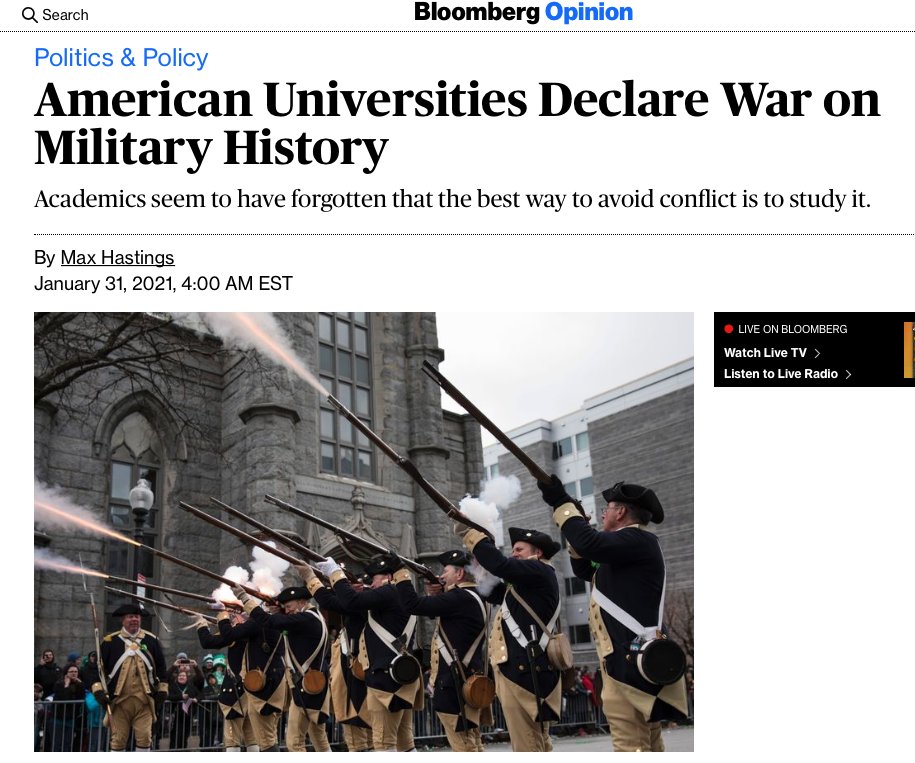1/ Thanks to @militaryhistori, I went down a smallish rabbit hole on the state of military history education in America today, precipitated by this Max Hastings lamentation which might be retitled, "Wealthy Best-Selling Author Yells At Cultural History Kids To Get Off His Lawn"
2/ Now as a political scientist, I have no dog in this fight, but I am an avid consumer of military history writ large, and it's redolent of the Great Diplomatic History Dirge" of the 1990s, led by my UCLA dissertation committee member Marc Trachtenberg.
3/ I can recall from the past 25 years at least 4 iterations of essays in the "Woke 'Academic' History Departments Hate Old White Guy War Stuff" genre, and what never ceases to amaze me is that, for essays by historians, they seem curiously oblivious to, you know, history.
4/ In 2006, for example, National Review correspondent John J. Miller declared that "the tenured radicals" of the post-Vietnam era have "sounded taps" on military history at universities. https://www.nationalreview.com/2006/09/sounding-taps-john-j-miller/
5/ Like all conservative/nationalist ideological tracts, these kinds of essays are premised on the notion that Once Upon A Time there was a Golden Era of academic departments chock-full of military history scholars, but the gol'durn hippies have chased them all away.
6/ For example, Hastings quotes Paul Kennedy who asks rhetorically, “Can you imagine Chicago or Berkeley or Princeton having War Studies departments?" Hardee-har-har, of course you can't! Why? "Military history is the most noxious of the ‘dead white male’ subjects," sez Kennedy.
7/ Those dastardly Cancel Culture Libs! The problem, though, is that some military history guy has *always* been grousing about those hippie kids on his history department lawn pretty much from the beginning of the modern American academic profession.
8/ At the 1913 meeting of the American Historical Association, Robert Matteson Johnston referred to "the disrepute" which which "old-fashioned military history" was treated in the US, a claim seconded by then-Army Captain Arthur L. Conger (later 2nd Division G2 in WW1).
9/ In 1930, Columbia University historian Robert L. Schuyler observed "to judge from recent historical textbooks, military history seems to be under about as dark a cloud as the great man theory."
10/ However, Schuyler was honest enough to admit the discipline "gave insufficient attention to economic, social and cultural history, [so] it is not strange that a reaction set in."
11/ In "The Teaching of Military History" (1949), Duke University's Theodore Ropp complained that "men of learning" had to "change their attitude of mind toward war and...regard it as a branch of knowledge worthy of exploration."
12/ Citing Liddell Hart's 1933 "Ghost of Napoleon," Ropp lamented, however, that "modern historians...have yielded to the pendulum of fashion." As a result, he wrote, "advanced research in the history of warfare can be done in only a few places."
13 / In 1962 (surely the height of the Golden Age), Professors Dexter Perkins (Rochester) & John Snell (UNC) prepared a report for the American Historical Association that found military history was available at slightly less than 4% of all jr colleges, colleges and uni's.
14/ Hastings' complaint about the dire straits of academic military history today is, in fact, a characterization of the discipline for its entire modern existence. The better question, then, is why do military historians believe their field should loom larger on campus?
15/ The bottom line is that military history is, and has always been, a niche field in academic history departments.
16/ I suspect the implicit privilige in Hastings' complaint is a reflection of the *popular* market for military history & a corollary assumption that, since war looms large in popular culture, it stands to reason lots of people would/should want to study it systematically...
17/ ... when in fact I'd suggest that *because* of its popularity there's comparatively little social demand for more scholarly work. Military history is, in effect, a victim of its own mass-market/pop culture success.
@threadreaderapp unroll

 Read on Twitter
Read on Twitter




